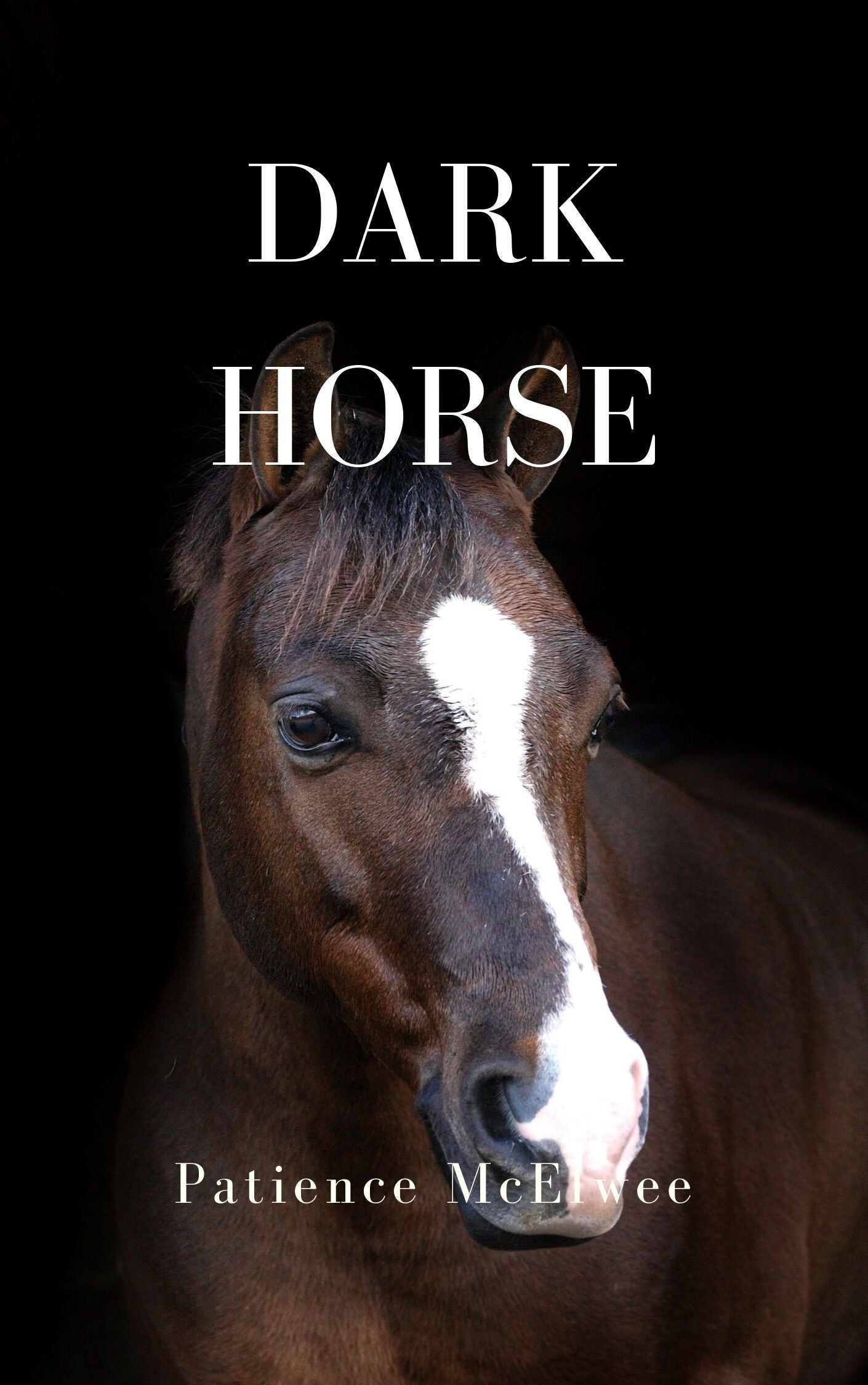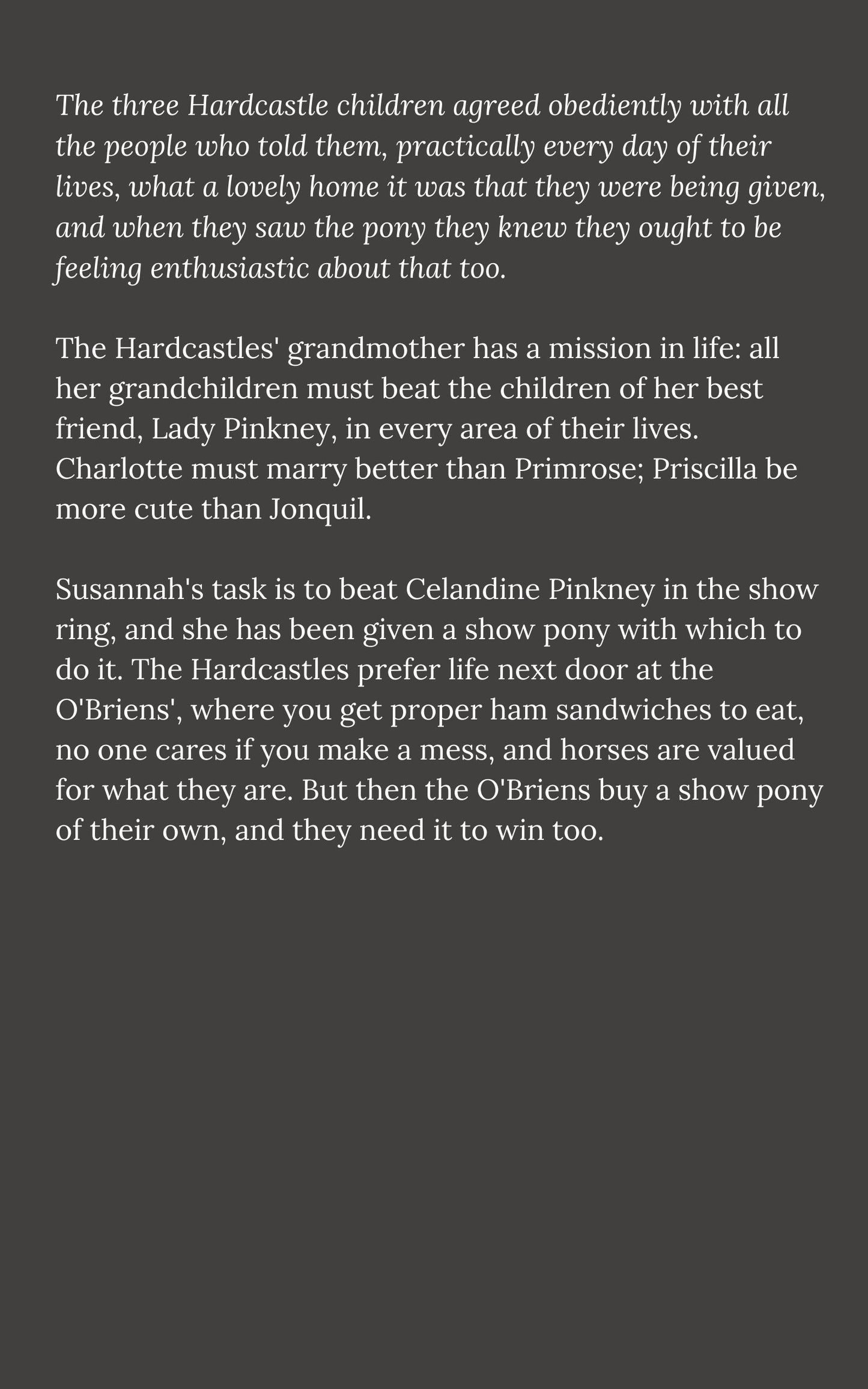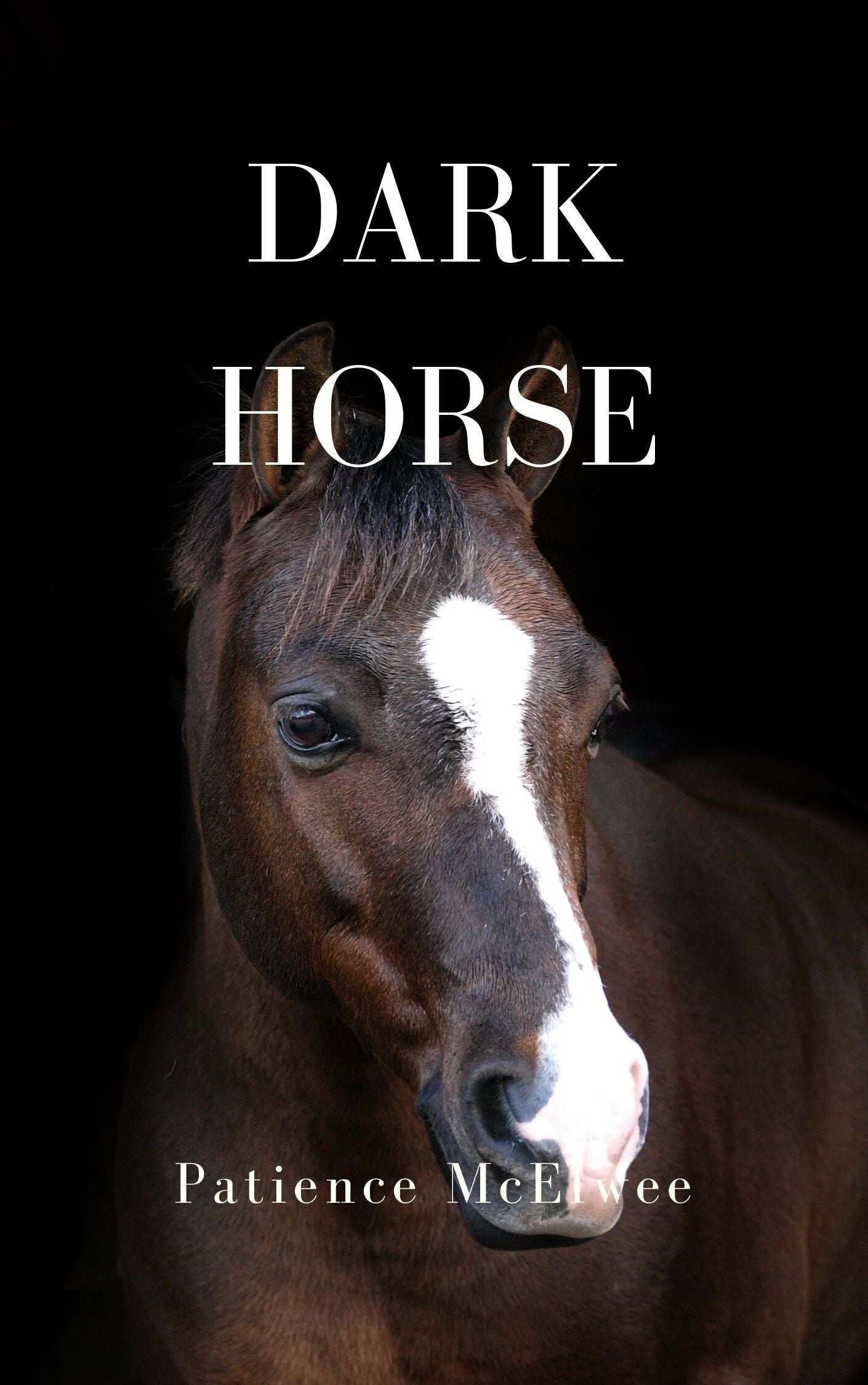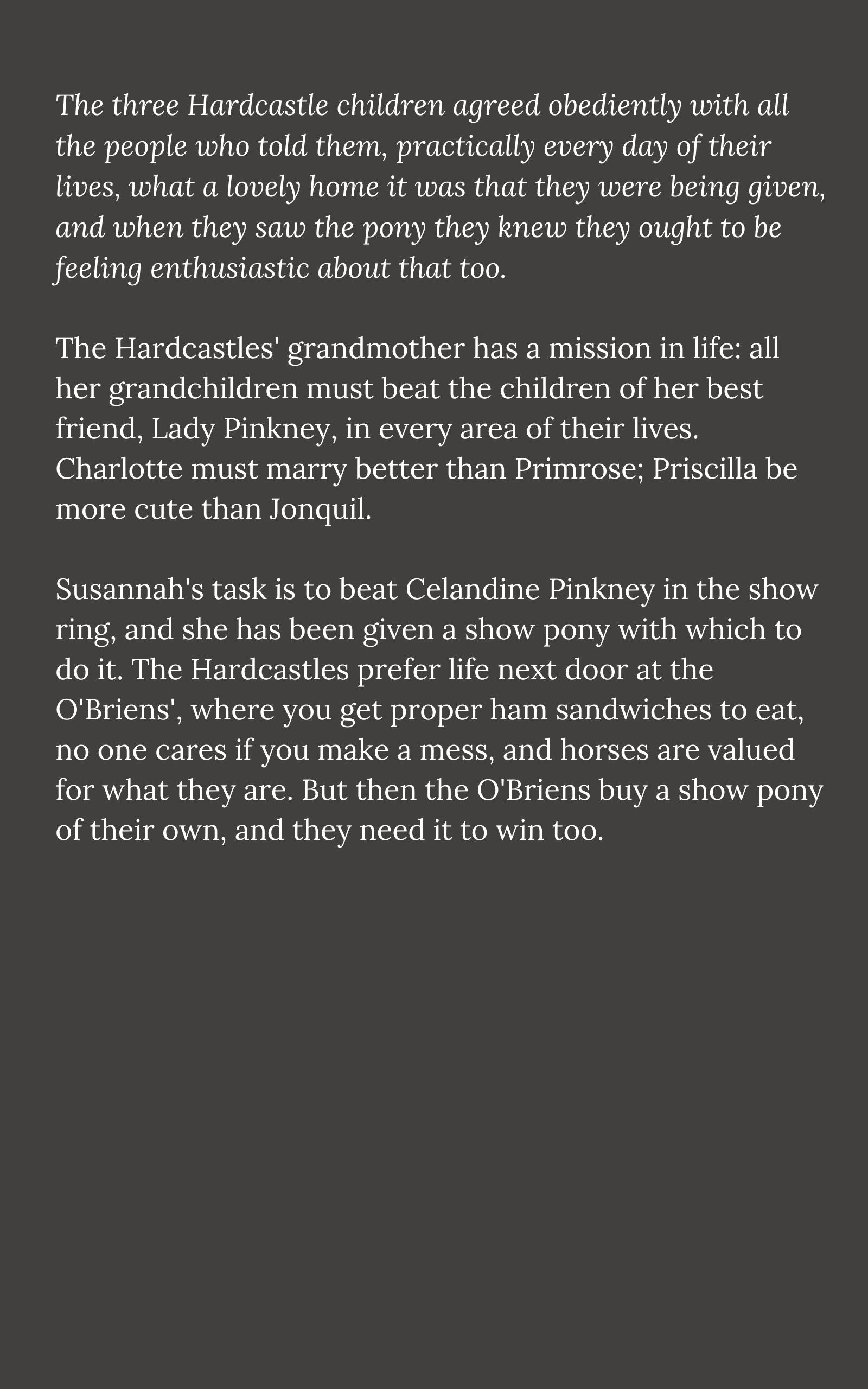Jane Badger Books
Patience McElwee: Dark Horse (eBook)
Patience McElwee: Dark Horse (eBook)
Couldn't load pickup availability
Share
The Hardcastles' grandmother has a mission in life: all her grandchildren must beat the children of her best friend, Lady Pinkney, in every area of their lives. Charlotte must marry better than Primrose; Priscilla be more cute than Jonquil. Susannah's task is to beat Celandine Pinkney in the show ring, and she has been given a show pony with which to do it. The Hardcastles prefer life next door at the O'Briens', where you get proper ham sandwiches to eat, no one cares if you make a mess, and horses are valued for what they are. But then the O'Briens buy a show pony of their own, and they need it to win too.
Page length: 142
Original publication date: 1958
How do I get my book?
How do I get my book?
There's a link to download in your confirmation email. If you need help, the email from Bookfunnel, who handle our delivery, will walk you through downloading the file that works best for you.
How do I read my eBook?
How do I read my eBook?
You can read the ebooks on any ereader (Amazon, Kobo, Nook), your tablet, phone, computer, and/or in the free Bookfunnel app.
Read a sample
Read a sample
The three Hardcastle children realised that it was very kind of their grandmother to give them a show pony of their very own, just as it was kind of her to give them, orphans as they were, a home. They agreed obediently with all the people who told them, practically every day of their lives, what a lovely home it was that they were being given, and when they saw the pony they knew they ought to be feeling enthusiastic about that too.
She came nimbling down the ramp of the horse-box, the lightest possible golden chestnut, plaited and shining, her browband a fanciful emerald green, and she reminded them all, at once, of the blonde, spoilt children they met at the parties they were now forced to attend in ever-increasing numbers.
For a few moments they could find nothing sufficiently enthusiastic to say. They were used to making the best of whatever place they found themselves in, because ever since they were very small they had had to go where they were sent, to whatever relation would put up with four children whose ages never seemed to be just right. But up till now they had chosen their own ponies, and they had got used to thinking of ponies as their own personal responsibility. Swedish Rhapsody, the show pony, had been wished on them.
Casey, the groom, who was Irish and only kept because he would condescend to have an eye to the pigs that formed part of a model farm that was as neat, like the rest of the premises, as a toy in a cardboard box, took the straw from his mouth and spoke, before any of the children could manage to open their mouths. “You wouldn’t get far on that one, if hounds were running.”
Their grandmother answered him coldly. “This is a show pony, not a hunter, you know.” Then she turned to the children, expecting a show of gratitude equal to the fact that the pony had cost every penny of four hundred guineas. “Well, chicks? Isn’t she a picture?”
Susannah went forward to pat the pony, hoping to conceal the fact that she had not fallen instantly in love with it, and found it exactly like touching the tightly upholstered yellow satin sofa in the drawing-room, that not even Wong, the Peke, was allowed to sit on, and certainly not children, with their sticky fingers and muddy shoes. She thought of her own pony, Cosy, now banished to a far-distant, thistly, dock-infested field, together with Matthew’s hideous, kind-hearted skewbald cob and Priscilla’s outgrown Shetland. Even in the summer Cosy’s skin had felt like velvety fur and she had eyes that swam with love and enthusiasm. The show pony showed the whites of her eyes when she was approached, and took a nip at Susannah’s sleeve.
“Gently, dear. You can’t pull this pony about, you know. She’s thoroughbred. You must remember that—all of you. Be very careful, always.”
It sounded as if they had all been in the habit of knocking their ponies about, like the rich, spoilt, ignorant children in pony books, who did not reform until the very last chapter.
“There’s no need for you to be frightened of her, Priscilla. She won’t hurt you if you’re gentle with her. She’s young, you see. Not like ... ” She did stop then, having once before referred to the Shetland as a dusty old hearth-rug, and been quite surprised that Priscilla had not been amused.
Priscilla, who was eight and much younger than the others, was standing with her hands deep in the pockets of her jeans, chewing a grass stalk in as close imitation as she could get of Casey, the groom, in spite of oftenrepeated warnings that children who sucked grass got things wrong with them too disgusting to mention. She was frightened of nothing in the world, on four legs or on two. She was not even frightened of her grandmother, as the others were, or of her grandmother’s maid, Stringer, who was known to Casey and the daily women as the Copper’s Nark, and who made it her business to report every instance of untidiness, every light left burning, every time the bath had a high-water mark.
“Darling, how often have I told you not to suck grass? You’ll get ... well, never mind. What Wong had, that time we had to have the vet. And you’ll spoil the shape of your mouth, thrusting out your lower lip like that. Little girls ought not to pout—they ought to be as happy as the day is long.”
Mrs Aston-Pringle was not in the least like other people’s grandmothers. She hadn’t got untidy grey hair done in a bun and a face like a nice wrinkled apple, nor did she wear lace, smell of lavender, or walk about leaning on a stick. She was slim and extremely smart, with bright red finger-nails and her hair done up in tight curls of mauvish blue. Once a fortnight regularly she went up to London and came back again looking even younger and smarter and carrying a stack of shiny magazines all about Gracious Living.
Gracious Living was, unfortunately, her motto, which meant there was not one room in the house where what she called litter might be left about, paints or cutting out things or what she referred to unfavourably as storybooks. The house itself, years ago, had been a proper farm, but now it looked no more like a farm than its owner looked like a grandmother. The warm little rooms had been thrown together to make two long chilly ones, and artificial logs, electrically heated, glowed half heartedly in winter in place of red-hot heaps of smouldering ash that could be blown into roaring life with a pair of bellows, where you could roast chestnuts or potatoes or see fairy castles according to your mood.
The diamond-paned windows had all been ripped out and replaced with high, wide, clear glass through which could be seen horrid gaps where the gnarled old fruit trees had been cut down to expose the view. Some neat cypresses had been planted to replace them, because they reminded Mrs Aston-Pringle of dear sunny Italy, where she could not now go because she had the children to think of. The cypresses reminded Susannah, who was gloomier than the others, of a new churchyard.
The original farmyard had been turned into a hard tennis court, and the farm itself was well away from the house, because of sounds and smells. The pigs and chickens no longer wandered at will, snuffling and pecking at the windfalls. The pigs were housed in model sties and the hens captive in batteries.
The place used to be called Puddephats and was now known as The Lawns. Priscilla had once said it might just as well be called The Gravel or The Concrete.
The children had lived there now for four months, ever since their grandmother had decided that the clergyman uncle with whom they had been perfectly happy was neither able nor even willing to Do Anything, as she expressed it, about their sister Charlotte.
Standing gazing at Swedish Rhapsody, who had cost four hundred guineas, a fact they were not going to be allowed to forget, it came into Susannah’s head that their elder sister was being made to lead a life comparable to that of a show pony, animals for whom they had always felt sympathy. Groomed and plaited and only allowed out for the day once a week, they were not allowed to hunt, or gallop round wide fields in company with other ponies. That was partly why they had never wished to own one. They were not companionable, and if they were not happy in their lot there was nothing their child owners could do to relieve it. Charlotte too might become sour and unfriendly and too grand for ordinary life, after a bit more of what their grandmother called Social Life in capital letters. She had gone to a tennis party this afternoon, after her grandmother had weighed the advantages of her meeting some Really Nice People against the danger of her getting freckles from the sun. Susannah had freckles, but it wouldn’t begin to matter until she was older.
Matthew spoke then. He was the favourite, because he was the only boy, and he dared to ask the question to which Susannah longed to know the answer.
“Which of us is going to ride her?”
Mrs Aston-Pringle spoke decidedly. “You can both school her—under supervision , of course—but Susannah will show her. She’s only fourteen, so she’ll be able to do it for two years. Remind me to get you some hairnets, Susannah, when I go up for my rinse.”
Hair-nets. Susannah made a face to herself. She had a lot of rebellious hair, much more nearly the colour of a real chestnut than any so-called chestnut pony, and she knew she looked quite unlike what they called Show Pony Misses, with their black coats, leather gloves, agonisingly tight jodhpurs, and bowler hats that made a cruel rim round their foreheads.
“And you can’t show in a velvet cap, of course. I shall have to get you a bowler.”
“What about me?” Priscilla asked boldly. “What am I going to ride?”
“The donkey, darling,” her grandmother said. “You’ll look sweet on him. We must think of a fancy dress for you. A little Italian peasant girl, perhaps—then you’ll remind me of happy times ... ”
Matthew kicked his youngest sister on the ankle as she opened her mouth to protest. By now he and Susannah, and Charlotte as well, had learnt that protests did as little good as grumbling about the weather. All they could do to relieve their feelings was to foregather in the potting-shed, whenever they could manage to get away unobserved, and plot ways and means of escape from what was distasteful to them in their present life and express their hopes that a time might come when they would no longer be sent from one relation to another like so many parcels without any reference to their own wishes.
Who's in the book?
Who's in the book?
Humans:
Charlotte, Susanna, Matthew and Priscilla Hardcastle, Mrs Aston-Pringle (the Hardcastles' grandmother), the Pinkneys: Primrose, Celandine, Jonquil, Merlin, Lady PInkney; Tim and Shamus O'Brien
Equines:
Swedish Rhapsody, Cosy, Clown, Rose of Erin
Other titles published as
Other titles published as
Series order
Series order


It's difficult to know when the book is set - when girls wore dirndl skirts and people still used telephone boxes, anyway.
The sentences are somewhat convoluted but it isn't a bad story - written with a dash of cynicism but not as humorous as Ruby Ferguson's Jill books.
There are some engaging characters but very little actual riding. Only one of the three shows the children are entering is described - most of it is getting ready for the shows.
Worth a read, anyway!


